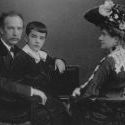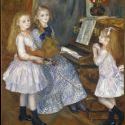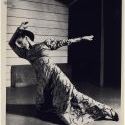-
03
-
03
-
03
-
03
-
03
-
03
-
03
-
03
-
03
-
03
-
03
-
-
-
03
-
03
-
03
-
03
-
03
-
03
-
03
-
03
-
03
-
03
-
03
-
-
03
-
03
-
03
-
03
-
03
-
03
-
03
-
03
-
03
-
03
-
03
-
-
03
-
03
-
03
-
-
03
-
03
-
03
-
03
-
-
03
Deep Focus: Enriching the Aspen Experience
An array of micro-essays by accomplished musicologists, curated to enhance and enrich your historical and aesthetic engagement with the musical programming offered at Aspen’s summer seasons.
Aspen & American Music

In the final entry of the 2024 Deep Focus series, Assistant Program Book Editor Christine Marie Goss takes a whirlwind tour through the history of the Aspen Music Festival, with special attention to its place in American composition, its sterling contribution to performance at the highest level, and its potential to bring inclusive change to the world of classical music.
(continue reading)Intimate Portraits: Richard Strauss’s Family Life Through Music

The relationship between Richard Strauss and Pauline Strauss (née de Ahna) was heightened by emotional turbulence and strong-headed personalities on both sides. Surveying a few of the Aspen Festival’s 2024 performances of Strauss’s music, Dr. Patricia Prokert paints a rich portrait of a marriage through descriptions of lieder (songs) and the dramatic tone poem Ein Heldenleben.
(continue reading)Children’s Music at The Aspen Music Festival

"Children’s Music at The Aspen Music Festival” by Kate Hamori addresses the enduring and varied roles that childhood plays in classical music. Children—as performers, intended audiences, and direct sources of creative inspiration for adult-composers—inadvertently exert tangible influence over the classical canon as we know it. Furthermore, many adult composers, at one point or another, write works based on their own childhood memories, either to simply reminisce or as a means by which to cope with their adulthood struggles. While it is easy to think of children and childhood as afterthoughts in the arts, Hamori demonstrates how children play a significant role in shaping musical culture, and that childhood is an inescapable part of classical music's legacy.
(continue reading)Sounds of Pride: Queer Musical Identities, Histories, and Belonging

"Sounds of Pride: Queer Musical Identities, Histories, and Belonging” by Dr. Kristin Franseen explores how music shapes queer identity in the U.S. from the from the twentieth century to today. From Copland’s Appalachian Spring, to Strayhorn’s re-imagined Tchaikovsky, to Oliveros's playful critique of Beethoven, these composers challenge norms, redefine tradition, and celebrate diverse voices in classical music.
(continue reading)The Recovered Vision of Richard Gerstl

Explore an artist's view of Vienna's musical vanguard, tragically lost before its time, in a new Deep Focus essay on Richard Gerstl. The painter had personal relationships to the composers Arnold Schoenberg, Alexander Zemlinsky, and others in their circle.
(continue reading)-
03
-
03
-
03
-
03
-
03
-
03
-
03
-
03
-
03
-
03
-
03
-
-
-
03
-
03
-
03
-
03
-
03
-
03
-
03
-
03
-
03
-
03
-
03
-
-
03
-
03
-
03
-
03
-
03
-
03
-
03
-
03
-
03
-
03
-
03
-
-
03
-
03
-
03
-
-
03
-
03
-
03
-
03
-
-
03